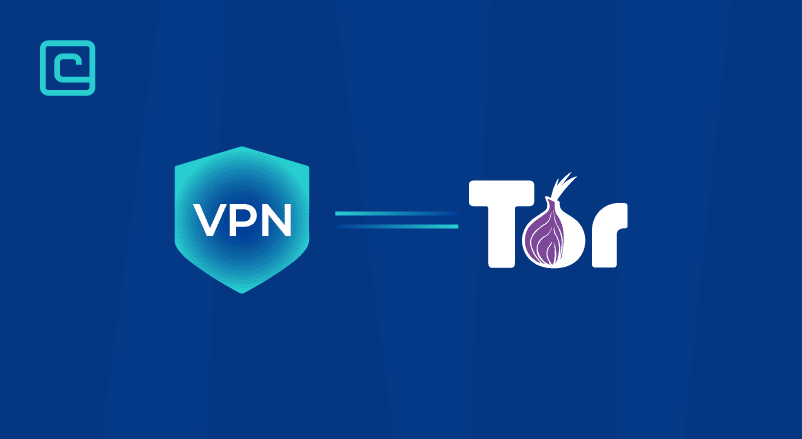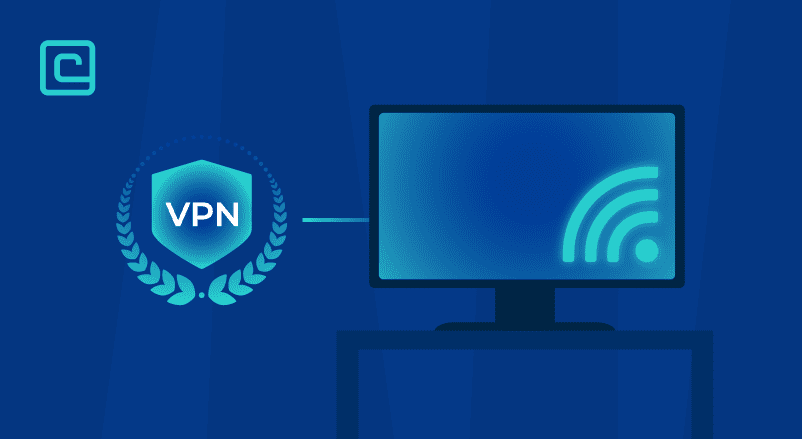Should You Use a VPN With Tor?

Key Points
- Combining a VPN with Tor can provide an extra layer of encryption, making it even more difficult for someone to intercept and decipher your online traffic.
- A VPN can help you bypass geolocation restrictions, allowing you to access content that may be restricted in your region.
- It’s crucial to use a safe and trusted VPN when browsing the dark web with The Onion Router.
Tor and VPNs are powerful tools used for online security and privacy. They have similar functions but perform them in different ways. So, what is the difference between a VPN and a Tor? And should you use a VPN with Tor together? Let’s dig in and find out.
Test Your VPN Knowledge – Take A Quiz!
What Is the Difference Between Tor and VPN?
Tor, short for The Onion Router, is an anonymity network that routes internet traffic through a global network of random nodes. It is a decentralized network operated by volunteers. The Tor network consists of many of these volunteer-operated servers that serve as entry and exit nodes.
Anyone can use Tor freely, as it is an open network. Tor is a singular product, as there is only one Tor network. In contrast, VPNs are tools, and there are many different VPNs you can use to protect your Internet connection.
A VPN ensures all data coming in and going out of your device is protected and private. However, unlike Tor, a VPN doesn’t let you browse anonymously. With this in mind, to better understand the differences in how they operate, let’s discuss how VPNs and Tor work.
How Does Tor Work?
Tor traffic travels through at least three relays (a relay is more commonly known as a Tor node). The multiple jumps your traffic takes on the network allow you to stay anonymous. The encrypted message goes through a guard node, a middle server, and an exit node.
Tor serves as the gateway to the Dark Web. You can connect to the network using a special Tor Browser, also known as the Onion Browser. All your internet activities are anonymous when you use it.
That said, although the Tor network encrypts your traffic, it doesn’t hide the fact that you’re using it. In other words, your ISP will still know about your Tor connections. Your ISP can still see your IP address when you download Tor, but not your Tor traffic.
How Does a VPN Work?
A VPN is a private network that encrypts your entire network connection and tunnels all of your data through an intermediary server. Unlike Tor, when you use a VPN, all your internet activity on the device is protected, not only what you type using search engines.
When you connect to a VPN server, your network connection is routed through an encrypted tunnel. Your real IP address is swapped with a new IP address from the VPN’s servers. Due to this, your real IP stays hidden, even from your ISP.
VPNs provide a long list of benefits. In addition to safeguarding your real IP address, they prevent anyone from tracking you and protect you from advertisers and other third parties. They also enable you to access geo-restricted content, avoid censorship, and enjoy the Internet without any restrictions.
Should You Use VPN with Tor?
According to the official Tor documentation, there is no need to use Tor with VPN to increase your privacy. The reason is that a Tor network is secure enough, and can suffice on its own. However, there are some benefits to combining the two. Should you want to combine a VPN with Tor, there are two approaches you can explore:
- Tor over VPN
- VPN over Tor
There are discernible differences between these two that directly affect your privacy. To better understand which of the two options is a better pick, let’s explore each method in detail.
Tor over VPN
This method requires you to connect to your VPN before opening the Tor Browser. This way, the VPN encrypts your traffic before conducting your business on the dark web.
The entry node of the Tor network will receive your VPN server IP address as the origin of your data. Your real IP address would be hidden from the Tor entry node.
A VPN in this case would also hide the fact that you access the Tor Network from ISP. This way you can boost your privacy and anonymity. Because of this, using Tor over VPN is the better option when you want to access onion sites while hiding the fact you’re using Tor.
Pros of using Tor over VPN
- It provides extra security and anonymity
- It helps you hide your Tor activities from your ISP
- Hides your IP and protects you against malicious entry nodes
- Access to onion sites
Cons of using Tor over VPN
- If your VPN provider logs your data and works with authorities, this method is not viable for online privacy and anonymity
If you are considering connecting to Tor over VPN, NordVPN is an excellent VPN to use. It’s a very reputable VPN that doesn’t keep any connection logs data and is independently audited.
VPN over Tor
This method is the opposite of the first one. It routes your VPN traffic over Tor Network. To do that you will have to manually configure your VPN to work with Tor. It is not a matter of simply turning on your VPN and you will need some technical expertise or assistance.
With the VPN over Tor method, the exit nodes reroute your internet traffic to your VPN server. This eliminates the risks of a malicious Tor exit node.
With this method, Tor entry nodes will see your real IP address and your VPN will only see the entry address of the exit node. With this method, your ISP will have no clue when it comes to your Deep Web activities.
Pros of VPN over Tor
- Allows easier access to sites that block Tor nodes.
- It protects you from malicious Tor exit nodes
- It helps you hide your VPN use from ISPs
Cons of VPN over Tor
- It is considered difficult to use as you need some technical expertise to configure your VPN for use.
For example, NordVPN has special servers called Onion over VPN. It routes your VPN traffic over Tor Network and even allows you to access Deep Web websites without Tor Browser. The downside of this feature are the comparably slow speeds.
When to Use a VPN with Tor
You can boost your privacy when using a VPN with Tor together. A VPN is not necessary when browsing only on Tor Network, but it protects everything else when you do not use it. A VPN hides your internet activities from ISP, including the fact that you access Tor.
It would also protect your internet traffic like torrenting while only using Tor Browser you could not do that. You should use a VPN with Tor when:
- You Have a Reliable VPN Provider – A reliable VPN is critical for your privacy and anonymity on Tor. You should avoid the ones that log your traffic at all costs. If you’re not sure your VPN is entirely trustworthy, it’s best to not use the VPN for Tor.
- Hide Use of Tor From Your ISP – Many ISPs are not a fan of Tor. They will track your IP address to see whether you’re using the Tor browser.
- When Access to Tor Browser is blocked – Sometimes you may not be able to access Tor Network because it is blocked. Using a VPN would allow you to bypass those restrictions.
- Protect Yourself From Malicious Nodes – A compromised Tor entry node or exit node is one way for hackers and authorities to try and break Tor’s anonymity. If such an attack happens, a VPN will greatly reduce the chance that your real IP address will be exposed.
- Obtain Privacy Outside Tor Network – A VPN hides the use of other applications on your device like P2P and torrent clients. It also hides all other browsing activities when you don’t use the Onion browser.
- Bypass geo-blocking – Just like ISPs, many websites are not fans of Tor. Some sites do not allow connections from known exit nodes. Using a VPN would allow you to unblock specific geo-restricted content more easily.
Is It Safe to Use a VPN with Tor?
It is safe to use a VPN with Tor. Using a VPN that does not keep any logs could even boost your privacy and anonymity. However, for this to be true, it is important to have a VPN with security and privacy features that are suited for that.
Naturally, not all VPN providers come with the same features. So, to ensure private and secure connections, you need to carefully pick a Virtual Private Network that meets specific criteria. Here are the key features every Tor VPN should possess:
Compatibility With the Tor Browser
Not all VPNs can be used with Tor. Some may not be compatible or would not allow connecting to the network. Luckily the most popular services are fully compatible. Apart from this, different VPN providers will have varying features. With many options available online, make sure that your Tor VPN fits all of your needs and preferences.
Strong VPN Connection Encryption
A reliable Tor VPN comes with good encryption for security. Preferably, this includes AES 256-bit encryption. You should also know which communication protocol the VPN uses. Different protocols have different security capabilities.
Additionally, security features like an automatic kill switch are also valuable in protecting your connection and keeping your IP address safe from prying eyes. A kill switch automatically cuts off your connection if the VPN notices that your connection is unprotected.
No-Logs Policy
A good VPN promotes privacy and does not store user logs. While choosing a VPN, ensure it does not store users’ logs and has a clear policy about it. Both Tor and VPN services aim to keep your web traffic private.
Secure Location
A good VPN is located in countries that do not participate in the Five Eyes or Fourteen Eyes alliances. NordVPN, for example, is located in Panama, while ExpressVPN is located in the British Virgin Islands.
These are locations that don’t have any mandatory data retention laws This is essential, as it means that the VPN service can’t be pressured into divulging any user data.
Final Word
Ultimately, whether or not you should use a VPN with Tor depends on your individual needs and circumstances. Combining a VPN with Tor can potentially provide additional layers of security and privacy, but it can also introduce new risks and limitations.
On the other hand, it can also reduce the overall speed and performance of your internet connection. Moreover, it can potentially compromise your anonymity if you choose an unreliable or malicious VPN provider.
However, the advantages seem to outweigh the disadvantages. When looking to use the two tools together, it’s best to choose a VPN with privacy features like a No-Log policy and strong encryption. If you pick a trusted and reliable VPN, you can have a safe experience without compromising on network performance.
Tor and VPN FAQs
Is the Tor network safe?
The Tor network can provide a relatively high level of security. But, it’s not completely foolproof and can be compromised by attackers. It’s crucial for Tor users to take extra security measures and use the network responsibly to maximize their safety and privacy. This is why using a Tor VPN is the only solution.
Is Tor illegal to use?
No, using Tor is not illegal in most countries. However, we should note that some countries restrict or monitor the use of privacy tools, and using Tor in those countries could result in legal consequences. So, it’s always a good idea to check your local laws and regulations before using Tor or any other privacy tool.
What is the best VPN service for the Tor browser?
The best Tor VPN service is NordVPN. It offers a great VPN server network and superb privacy and security features. NordVPN also has an Onion over VPN feature. NordVPN’s Onion over VPN delivers additional privacy and makes this Tor VPN even safer to use.
Are Tor bridges better than a VPN server?
Tor bridges can be a good tool. They can help you access blocked content, and your Internet service provider isn’t able to block them. That said, Tor bridges are far less intuitive to use than an average VPN provider. This is because finding a Tor bridge can be hard and you need some technical knowledge to set one up.
Can I use a free VPN for Tor?
No, we don’t recommend using free VPN services when you use Tor. This is because free VPNs often lack the key security features and reliable connection speeds to ensure your experience is safe and reliable. If you want a fast VPN with robust security and privacy, it’s always best to use a premium VPN for Tor.
Can I go to the dark web without a VPN?
While you can gain access to the dark web without a VPN, we don’t recommend doing so. When you access the dark web, you may be exposing your device and your online identity to potential threats. So, when you use Tor, pairing it with a VPN provides you with a valuable additional privacy and security layer.

| 🌐 Website: | nordvpn.com |
| 🏢 Headquarters: | Panama |
| 📍Servers/Countries: | 5800+ servers in 60 countries |
| ₿ Accepts Cryptocurrency | Yes |
| 💸 Deals & Coupons | Get 68% off + 3 months extra |
Cybersecurity and VPN researcher

